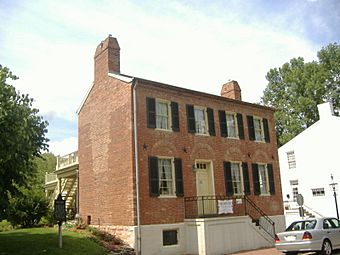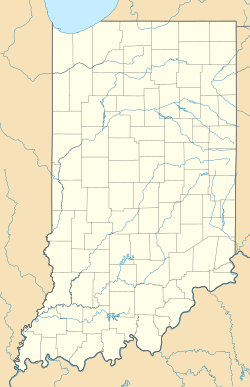Madison Historic District (Madison, Indiana) facts for kids
|
Madison Historic District
|
|

|
|
| Location | Roughly bounded by Crooked Creek, Springdale Cemetery, Michigan, New Hill and Telegraph Hill Rds., and Ohio River, Madison, Indiana |
|---|---|
| Area | 2,160 acres (870 ha) |
| Architectural style | Greek Revival, Federal, Italianate |
| NRHP reference No. | 73000020 |
Quick facts for kids Significant dates |
|
| Added to NRHP | May 25, 1973 |
| Designated NHLD | March 20, 2006 |
The Madison Historic District is a special area in Madison, Indiana. It's like a big outdoor museum! In 2006, it was recognized as a National Historic Landmark. This means it's super important to the history of the United States.
The district is known for its beautiful buildings and unique style. It includes famous places like the Lanier Mansion. This mansion is also a separate National Historic Landmark. Another important building is the Schofield House, where the Grand Lodge of Indiana began. The district covers 133 city blocks in Madison, looking out over the Ohio River.
Contents
A Look Back at Madison's History
Madison was a very busy place before the year 1860. It was a major center for transportation. Goods would arrive by river and then be shipped inland across Indiana.
However, when new ways of transportation appeared, Madison became less important. It wasn't until more than a century later that tourism helped the city become popular again.
Famous Buildings and Architects
Many of the beautiful buildings in the district were designed by Francis Costigan. He was an architect who grew up in Madison. Costigan loved the Greek Revival style, which looks like ancient Greek temples.
Two of his buildings are National Historic Landmarks:
The Lanier Mansion was once the home of James Lanier. He was a very important person. During the American Civil War (1862-1865), he lent money to Governor Oliver P. Morton. This helped the state government of Indiana keep running.
The Shrewsbury-Windle House was built for a steamboat captain named Charles Shrewsbury. He later became the mayor of Madison. Francis Costigan even built his own home in the district. It's famous for showing how to use a narrow piece of land really well. A long, thirty-foot room inside is a highlight of the house.
Railroad and History Museum
The district also has a restored Railroad Depot from 1895. You can also visit the Jefferson County Historical Society museum there. When the Madison & Indianapolis Railroad was built in 1835, Madison was actually bigger than Indianapolis, which is now the state capital! Irish workers helped build this important railroad.
The Underground Railroad Connection
Madison was a very important stop on the Underground Railroad. This was a secret network of safe houses and routes. It helped enslaved people escape to freedom before the Civil War. Many homes in the Madison Historic District were once part of this brave effort.
Gallery
 | Percy Lavon Julian |
 | Katherine Johnson |
 | George Washington Carver |
 | Annie Easley |













